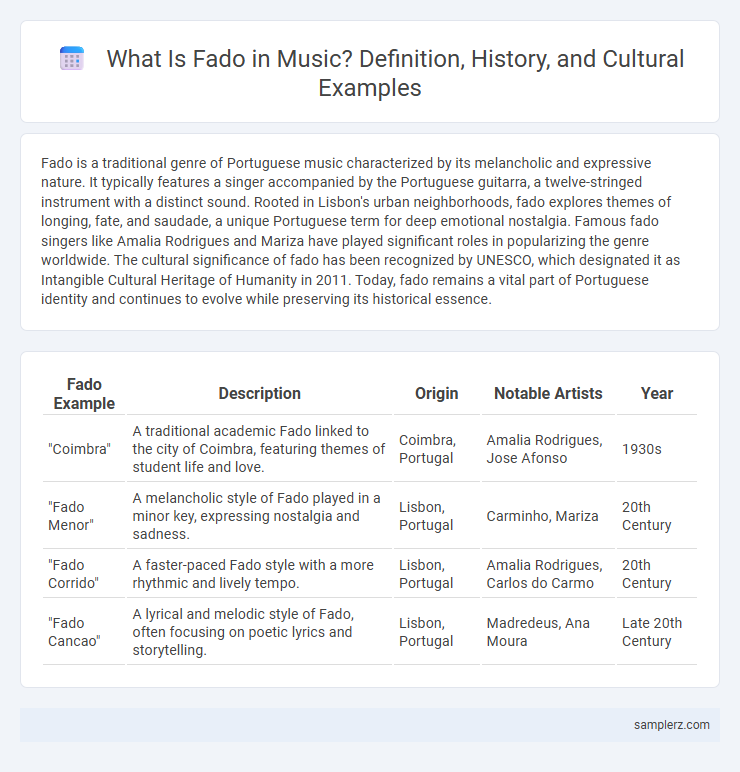Fado is a traditional genre of Portuguese music characterized by its melancholic and expressive nature. It typically features a singer accompanied by the Portuguese guitarra, a twelve-stringed instrument with a distinct sound. Rooted in Lisbon's urban neighborhoods, fado explores themes of longing, fate, and saudade, a unique Portuguese term for deep emotional nostalgia. Famous fado singers like Amalia Rodrigues and Mariza have played significant roles in popularizing the genre worldwide. The cultural significance of fado has been recognized by UNESCO, which designated it as Intangible Cultural Heritage of Humanity in 2011. Today, fado remains a vital part of Portuguese identity and continues to evolve while preserving its historical essence.
Table of Comparison
| Fado Example | Description | Origin | Notable Artists | Year |
|---|---|---|---|---|
| "Coimbra" | A traditional academic Fado linked to the city of Coimbra, featuring themes of student life and love. | Coimbra, Portugal | Amalia Rodrigues, Jose Afonso | 1930s |
| "Fado Menor" | A melancholic style of Fado played in a minor key, expressing nostalgia and sadness. | Lisbon, Portugal | Carminho, Mariza | 20th Century |
| "Fado Corrido" | A faster-paced Fado style with a more rhythmic and lively tempo. | Lisbon, Portugal | Amalia Rodrigues, Carlos do Carmo | 20th Century |
| "Fado Cancao" | A lyrical and melodic style of Fado, often focusing on poetic lyrics and storytelling. | Lisbon, Portugal | Madredeus, Ana Moura | Late 20th Century |
The Origins and Evolution of Fado Music
Fado music originated in early 19th-century Lisbon, deeply rooted in Portuguese maritime history and urban working-class neighborhoods. The genre evolved through influences from African rhythms, Moorish music, and Portuguese folk traditions, characterized by its melancholic melodies and expressive vocal style. Over time, fado incorporated modern instruments and contemporary themes, maintaining its cultural significance as a symbol of Portuguese identity and emotional expression.
Defining Characteristics of Fado
Fado is distinguished by its melancholic and soulful melodies that convey themes of longing, fate, and saudade, a deep emotional state of nostalgic yearning. The music typically features a solo singer accompanied by the Portuguese guitarra and classical guitar, creating an intimate and expressive sound. Its lyrical content often reflects personal stories of love, loss, and the struggles of everyday life, rooted deeply in Portuguese cultural identity.
Legendary Fado Singers and Musicians
Legendary fado singers such as Amalia Rodrigues and Carlos do Carmo have shaped the soul of Portuguese music with their emotive voices and profound interpretations. Their timeless performances brought fado to international acclaim, blending traditional guitar melodies with heartfelt lyrics that express saudade, a deep sense of longing. The influence of their artistry continues to inspire contemporary fado musicians and preserve the genre's cultural heritage.
Iconic Fado Songs and Their Stories
Iconic fado songs like "Cancao do Mar" and "Cheira a Lisboa" embody the soulful essence of Portuguese culture, expressing themes of longing and saudade. "Barco Negro," a haunting melody, tells the story of lost love and deep emotional pain, becoming a staple in fado repertoires worldwide. These songs, performed by legendary artists such as Amalia Rodrigues, have immortalized fado as a powerful narrative form within traditional Portuguese music.
Traditional Fado Instruments
Traditional fado music prominently features the Portuguese guitarra, a twelve-stringed instrument known for its distinct, melancholic sound that defines the genre's emotional depth. The classical viola, a six-stringed acoustic guitar, provides rhythmic accompaniment essential to fado's characteristic harmonic structure. These instruments, combined with heartfelt vocals, create the intimate and soulful atmosphere that embodies fado's cultural heritage.
Fado’s Influence on Contemporary Music
Fado, the traditional Portuguese music genre characterized by mournful melodies and expressive vocals, has significantly influenced contemporary music by inspiring artists worldwide to incorporate its emotive storytelling and melancholic tones into various genres. Modern musicians blend Fado's distinctive Portuguese guitar and soulful lyrics with jazz, pop, and electronic elements, creating innovative cross-genre sounds that honor its cultural roots. This fusion amplifies Fado's global reach, preserving its legacy while evolving the music landscape.
Fado in Popular Culture and Media
Fado, the traditional Portuguese music genre characterized by soulful melodies and melancholic lyrics, frequently appears in films, television, and literature, symbolizing Portugal's cultural identity. Popular media often feature notable fadistas like Amalia Rodrigues, whose recordings and performances have immortalized fado's emotional depth worldwide. Incorporating fado in contemporary music festivals and global streaming platforms has expanded its reach, reinforcing its significance in popular culture and modern entertainment.
The Role of Fado in Portuguese Identity
Fado, a traditional Portuguese music genre characterized by its melancholic melodies and poignant lyrics, plays a crucial role in shaping and expressing Portuguese identity. Rooted in themes of saudade, longing, and resilience, Fado reflects the historical and cultural experiences of Portugal, particularly in urban centers like Lisbon and Coimbra. This music form not only preserves Portuguese heritage but also fosters a deep emotional connection among generations, reinforcing national pride and cultural continuity.
Fado Festivals and Live Performances
Fado festivals in Portugal, such as the annual Fado Festival in Lisbon, showcase iconic artists and preserve the genre's deep emotional expression and traditional roots. Live performances, often held in historic venues like Casa de Fado, create intimate atmospheres that highlight the soulful vocals and Portuguese guitar essential to fado music. These events attract both local enthusiasts and international tourists, playing a crucial role in sustaining and promoting fado's cultural heritage.
Preserving Fado: UNESCO and Global Recognition
Fado, the traditional Portuguese music genre characterized by its melancholic melodies and expressive vocals, has gained global recognition through its inscription by UNESCO as an Intangible Cultural Heritage of Humanity. This UNESCO listing promotes preservation efforts, ensuring the transmission of authentic Fado practices to future generations. Worldwide festivals and cultural programs dedicated to Fado illustrate its enduring significance and help sustain its cultural identity on a global scale.

example of fado in music Infographic
 samplerz.com
samplerz.com